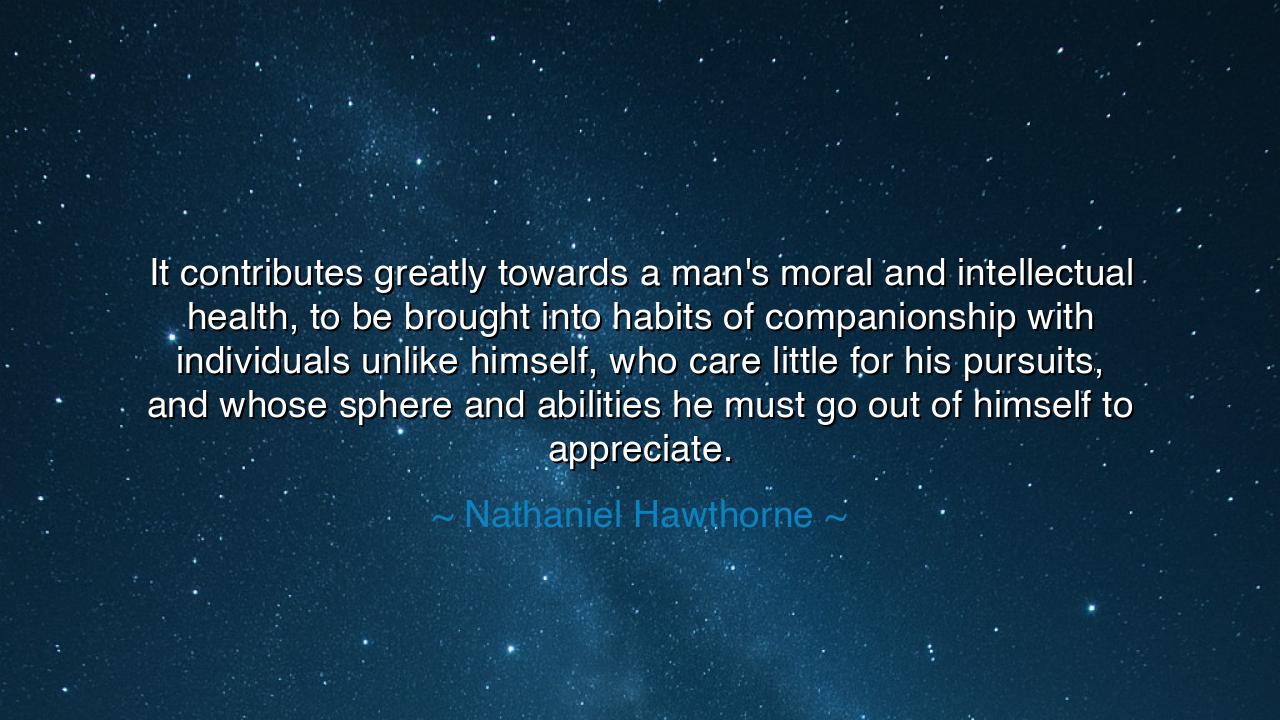
It contributes greatly towards a man's moral and intellectual
It contributes greatly towards a man's moral and intellectual health, to be brought into habits of companionship with individuals unlike himself, who care little for his pursuits, and whose sphere and abilities he must go out of himself to appreciate.






“It contributes greatly towards a man's moral and intellectual health, to be brought into habits of companionship with individuals unlike himself, who care little for his pursuits, and whose sphere and abilities he must go out of himself to appreciate.” – Nathaniel Hawthorne
In this profound reflection, Nathaniel Hawthorne, the master of human introspection, unveils a timeless truth: that growth is not born from comfort, but from encounter. He speaks of the soul’s need to be challenged, to be stretched beyond the familiar boundaries of its own thought. The words “companionship with individuals unlike himself” are not merely social advice—they are a call to spiritual and intellectual awakening. For when a man surrounds himself only with those who mirror his mind, he becomes like stagnant water—clear perhaps, but lifeless. Yet when he walks among those of different temper, belief, and pursuit, the current of his being begins to flow again, and he becomes alive with understanding.
Hawthorne’s insight arose in an age of great division—the nineteenth century, when America was torn between puritanical restraint and romantic self-expression, between industry and imagination. He himself was a recluse of Salem, a man who wrestled with the ghosts of conscience and the solitude of the artist. And yet, he recognized that isolation breeds blindness, while diversity of spirit nourishes wisdom. His own friendships—with thinkers unlike himself, such as Herman Melville and Ralph Waldo Emerson—revealed to him that the mind cannot thrive in an echo chamber. It must walk among other worlds if it is to know its own.
There is in his quote a quiet humility, for he admits that to understand others, one must “go out of himself to appreciate.” This is no small task—it requires courage, patience, and the breaking of pride. It is easier to remain among those who share our opinions, to rest in the warmth of agreement. But Hawthorne teaches that moral and intellectual health demand something harder: to seek out the stranger, the skeptic, the opposite, and to listen. The soul that dares to do this expands; it becomes richer, deeper, and wiser.
Let us recall the story of Mahatma Gandhi, who in his youth was a timid lawyer, bound by custom and fear. It was only when he lived among those unlike him—South Africans of other races, faiths, and conditions—that his moral universe began to widen. From their struggles, he learned compassion beyond tribe and creed. Had he not crossed that boundary, he might have remained small, unknown, untouched by greatness. But in embracing difference, he became a bridge between worlds. So too with all of us—our highest strength lies not in defending what we already know, but in learning from what once felt foreign.
Hawthorne’s words are also a remedy for the modern age, where people increasingly divide into tribes of sameness—each group echoing its own beliefs, each fearing the other. The intellectual health of society decays when men cease to speak across differences, when friendship becomes conditional upon agreement. In such times, his wisdom rings like a bell through the fog: only by companionship with the unlike can we preserve the sanity of our minds and the nobility of our hearts.
There is a sacred alchemy in encountering the unfamiliar. The poet learns from the scientist, the believer from the doubter, the ruler from the laborer. Each perspective, when truly heard, refines the other. The man who leaves the circle of his own comfort does not lose himself—he discovers a larger version of himself. His mind becomes supple, his compassion vast. As iron sharpens iron, so do souls sharpen one another when they meet in respect rather than fear.
Thus, let this teaching be passed from heart to heart: seek not only your reflection in others, but your contrast. Speak with those who challenge you. Listen to those whose worlds you do not yet understand. Travel beyond your comfort, even if only in conversation. For in doing so, you strengthen the pillars of your own moral and intellectual health. The mind that dares to meet the unfamiliar becomes both gentler and greater—it becomes whole.
And so, let the wisdom of Nathaniel Hawthorne stand as a guiding flame for all generations: To grow, one must go out of oneself. The path of understanding lies not inward, but outward—toward others, toward difference, toward the vast and beautiful variety of the human soul. When we walk that path, we do not merely learn about the world; we become part of its deeper harmony.






AAdministratorAdministrator
Welcome, honored guests. Please leave a comment, we will respond soon